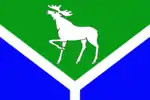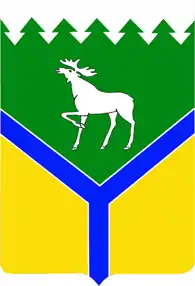Ust-Ishimsky District
Усть-Ишимский район | |
|---|---|
 Confluence of Siberian rivers - the Ishim flows into the Irtysh, at the village Ust-Ishim, in Ust-Ishimsky District | |
 Flag  Coat of arms | |
Location of Ust-Ishimsky District in Omsk Oblast | |
| Coordinates: 57°41′40″N 71°10′15″E / 57.69444°N 71.17083°E | |
| Country | Russia |
| Federal subject | Omsk Oblast[1] |
| Established | 25 May 1925 |
| Administrative center | Ust-Ishim[1] |
| Area | |
| • Total | 7,846 km2 (3,029 sq mi) |
| Population | |
| • Total | 13,480 |
| • Estimate (2018)[4] | 11,366 (−15.7%) |
| • Density | 1.7/km2 (4.4/sq mi) |
| • Urban | 0% |
| • Rural | 100% |
| Administrative structure | |
| • Administrative divisions | 13 rural okrug |
| • Inhabited localities[1] | 51 Rural localities |
| Municipal structure | |
| • Municipally incorporated as | Ust-Ishimsky Municipal District[5] |
| • Municipal divisions[5] | 0 Urban settlements, 13 Rural settlements |
| Time zone | UTC+6 (MSK+3 |
| OKTMO ID | 52657000 |
| Website | http://www.ust-ishim.narod.ru/ |
Ust-Ishimsky District (Russian: Усть-Иши́мский райо́н) is an administrative[1] and municipal[5] district (raion), one of the thirty-two in Omsk Oblast, Russia. It is located in the northwest of the oblast. The area of the district is 7,846 square kilometers (3,029 sq mi).[2]} Its administrative center is the rural locality (a selo) of Ust-Ishim,[1] which, as its name indicates, is located at the confluence of the Ishim River with the Irtysh.
Population: 13,480 (2010 Census);[3] 16,479 (2002 Census);[7] 21,670 (1989 Census).[8] The population of Ust-Ishim accounts for 35.6% of the district's total population.[3]
The Ust'-Ishim man, an ancient skeleton dated to 45,000 years before present, was discovered on the bank of the Irtysh River in Ust-Ishimsky District.
Notable residents
- Vilis Krištopans (born 1954), Latvian politician, Prime Minister of Latvia 1998–1999
References
Notes
- 1 2 3 4 5 Law #467-OZ
- 1 2 "General Information" (in Russian). Ust-Ishimsky District. Retrieved April 12, 2018.
- 1 2 3 Russian Federal State Statistics Service (2011). Всероссийская перепись населения 2010 года. Том 1 [2010 All-Russian Population Census, vol. 1]. Всероссийская перепись населения 2010 года [2010 All-Russia Population Census] (in Russian). Federal State Statistics Service.
- ↑ "26. Численность постоянного населения Российской Федерации по муниципальным образованиям на 1 января 2018 года". Federal State Statistics Service. Retrieved January 23, 2019.
- 1 2 3 Law #548-OZ
- ↑ "Об исчислении времени". Официальный интернет-портал правовой информации (in Russian). June 3, 2011. Retrieved January 19, 2019.
- ↑ Russian Federal State Statistics Service (May 21, 2004). Численность населения России, субъектов Российской Федерации в составе федеральных округов, районов, городских поселений, сельских населённых пунктов – районных центров и сельских населённых пунктов с населением 3 тысячи и более человек [Population of Russia, Its Federal Districts, Federal Subjects, Districts, Urban Localities, Rural Localities—Administrative Centers, and Rural Localities with Population of Over 3,000] (XLS). Всероссийская перепись населения 2002 года [All-Russia Population Census of 2002] (in Russian).
- ↑ Всесоюзная перепись населения 1989 г. Численность наличного населения союзных и автономных республик, автономных областей и округов, краёв, областей, районов, городских поселений и сёл-райцентров [All Union Population Census of 1989: Present Population of Union and Autonomous Republics, Autonomous Oblasts and Okrugs, Krais, Oblasts, Districts, Urban Settlements, and Villages Serving as District Administrative Centers]. Всесоюзная перепись населения 1989 года [All-Union Population Census of 1989] (in Russian). Институт демографии Национального исследовательского университета: Высшая школа экономики [Institute of Demography at the National Research University: Higher School of Economics]. 1989 – via Demoscope Weekly.
Sources
- Законодательное Собрание Омской области. Закон №467-ОЗ от 15 октября 2003 г. «Об административно-территориальном устройстве Омской области и о порядке его изменения», в ред. Закона №1591-ОЗ от 10 декабря 2013 г. «О внесении изменений в отдельные Законы Омской области в связи с принятием Федерального Закона "Об образовании в Российской Федерации"». Вступил в силу через три месяца со дня официального опубликования. Опубликован: "Омский вестник", №69, 31 октября 2003 г. (Legislative Assembly of Omsk Oblast. Law #467-OZ of October 15, 2003 On the Administrative-Territorial Structure of Omsk Oblast and on the Procedures of Its Change, as amended by the Law #1591-OZ of December 10, 2013 On Amending Various Laws of Omsk Oblast Due to the Adoption of the Federal Law "On Education in the Russian Federation". Effective as of the day three months after the official publication date.).
- Законодательное Собрание Омской области. Закон №548-ОЗ от 30 июля 2004 г. «О границах и статусе муниципальных образований Омской области», в ред. Закона №1642-ОЗ от 27 июня 2014 г. «О внесении изменений в Закон Омской области "О границах и статусе муниципальных образований Омской области"». Вступил в силу со дня официального опубликования. Опубликован: "Омский вестник", №45, №47, №49, 13, 20, 27 августа 2004 г. (Legislative Assembly of Omsk Oblast. Law #548-OZ of July 30, 2004 On the Borders and Status of the Municipal Formations of Omsk Oblast, as amended by the Law #1642-OZ of June 27, 2014 On Amending the Law of Omsk Oblast "On the Borders and Status of the Municipal Formations of Omsk Oblast". Effective as of the day of the official publication.).